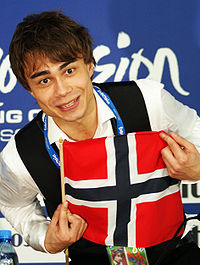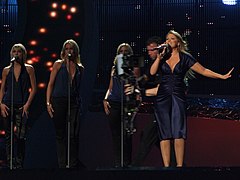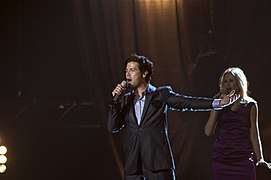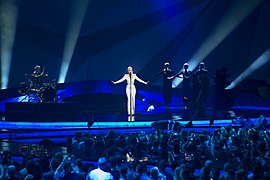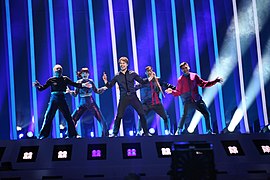Norway at the Eurovision Song Contest
- Broadcasting company

- First participation
- 1960
- Number of participations
- 58 (as of 2019)
- Highest ranking
- 1 ( 1985 , 1995 , 2009 )
- Highest Score
- 387 (2009)
- Lowest Score
- 0 ( 1978 , 1981 , 1997 )
- Points average (since first post)
- 66.70 (as of 2019)
- Average points per voting country in the 12-point system
- 2.43 (as of 2019)
This article looks at the history of Norway as a participant in the Eurovision Song Contest .
Regularity of participation and successes in competition
Norway first took part in the Eurovision Song Contest in 1960. The country sent the singer Nora Brockstedt, who reached number 4 out of 13. This made the debut relatively successful. Nora Brockstedt competed for the country in 1961, but could not repeat the success of the previous year and ended up in 7th place out of 16. In 1962, the country only ended up in the midfield with 10th place out of 16. In 1963 Norway reached the last for the first time with Anita Thallaug Space. The singer did not receive a single point. It should be noted, however, that the last place was a shared last place with Finland, the Netherlands and Sweden. In 1964, Norway was only moderately successful and reached 8th place out of 16. In 1965, however, Norway ended up in the lower midfield with 13th place out of 18. It was not until 1966 that the country was successful again in the competition. The singer Åse Kleveland was able to achieve 3rd place, which was Norway's best result in the competition to date. However, this success was short-lived. In 1967 the country landed again only in the lower middle field with position 14 out of 17. Also in 1968 only position 13 out of 17 could be achieved. In 1969, Norway finished last for the second time. In 1970 the country voluntarily renounced participation - together with Sweden, Finland, Portugal and Austria - in protest in the rating system after four countries had shared first place in 1969. It wasn't until 1971 that Norway returned to competition.
In 1971 Norway did not achieve a good result either and ended up on the penultimate place. The following years were not very successful either. In 1972 the duo Benny Borg & Grethe Kausland landed 14th out of 18 again only in the lower midfield. In 1973, Norway again achieved an average ranking of seventh out of 17. In 1974, however, Norway finished last for the third time. However, it was a shared last place with Germany, Portugal and Switzerland. Also in 1975 Norway could not achieve a good result and was only penultimate. In 1976, the country came last for the fourth time, but this time alone. In 1977 there was only one result in the lower midfield with position 14 out of 18, while in 1978 the fifth last place was achieved. It was not until 1979 that the singer Anita Skorgan achieved an average ranking of 11th out of 19. Nevertheless, in 1980 Norway ended up only in the lower midfield with 16th place out of 19. In 1981, the sixth last place was achieved, which was a record in the competition until then. In 1982, however, there was again an average result with 12th place out of 18. In 1983, for the first time in ten years, a place among the top ten was achieved with 9th place out of 20. Nevertheless, this success could not continue. In 1984, Norway only came third from the bottom. It was not until 1985 that the country became more successful in competition.
In 1985 Norway finally achieved its first victory in the competition, which was the highest score for the country to date with 123 points. But here too the success could not last. In 1986 the country ended up only in the middle of the field with 12th place out of 20. In 1987, however, it was again placed in the top ten with 9th place. In 1988 the country was even more successful than in the previous year and achieved 5th place. From 1989 to 1992, however, the country was again not very successful. In 1989 and 1991 only 17th place and 1992 only 18th place, which means that results were only in the lower midfield. In 1990 there was even the seventh last place for Norway in the competition. From 1993 to 1996 Norway had its most successful phase in the competition. After all, the country only achieved places in the top ten during this period. The singer Silje Vige took 5th place for the country, while the duo Elisabeth Andreassen & Jan Werner Danielsen achieved 6th place in 1994. In 1995 Norway was able to achieve its second victory in the competition. So the band Secret Garden won the competition in Dublin and thus stopped Ireland's winning streak in the competition, which could win the competition in 1992, 1993 and 1994. With 148 points the band even got a new high for Norway. In 1996, when the competition took place in Oslo, the singer Elisabeth Andreassen, who won Norway as part of the Bobbysocks in 1985 and 6th place for Norway together with Jan Werner Danielsen in 1994, achieved 2nd place for the country. Norway achieved second place in the competition for the first time and achieved its third-best result to date. In 1997 the successful years for Norway were over again. The singer Tor Endresen took eighth last place in the competition for Norway. However, the country finished last along with Portugal. In 1998 Norway was more successful again and achieved a good result with 8th place. In 1999 and 2000, two places in the midfield were achieved with 14th and 11th place. In 2001, however, Norway came in ninth from last place in the competition. However, the singer Haldor Lægreid shared this with Iceland. In 2002 Norway had to sit out for the first time because of its poor position in the previous year. It was only the second time since the debut in 1960 that Norway had not participated. In 2003 Norway was allowed to participate again.
When they returned in 2003, the country reached fourth place, which was the best result since 1996. After that, the Norwegian placements were like a roller coaster ride. In 2004 Norway achieved its tenth last place in the competition, while the band Wig Wam achieved a good result with ninth place in 2005. In 2006, the country ended up in the midfield again in 14th place. In 2007 Norway was eliminated in the semifinals for the first time after Guri Schanke only reached 18th place out of 28 in the semifinals. In 2008 Norway qualified again for the final and was able to reach 5th place there. In 2009 Norway scored its third win in the competition. Alexander Rybak was able to achieve first place in the final as well as in the semifinals. What was remarkable about the victory was that Norway scored 387 points. It is not only the highest number of points for Norway in the competition to date, but also represents the highest number of points in the old rating system of the Eurovision Song Contest, which was valid until 2015. From 2010 Norway was no longer so successful. The singer Didrik Solli-Tangen only achieved a placement in the lower midfield in 2010 in Oslo with 20th place out of 25. In 2011, the country was only third from bottom in the semifinals and was eliminated for the second time in the semifinals. In 2012, the singer Tooji narrowly qualified for the final, but only reached last place there, which is the eleventh last place for Norway in the competition. It was not until 2013 that the country was successful again in the competition.
Finally, in 2013 Norway sent the singer Margaret Berger, who already reached 3rd place in the semifinals and then achieved 4th place in the final. It was Norway's best result since 2009. However, the entries from 2014 and 2015 each achieved a place in the top ten. Singer Carl Espen in 2014 and the duo Mørland & Debrah Scarlett each achieved 8th place in 2015. It was the first time since 1996 that Norway was placed in the top ten three times in a row. In 2016 this success ended again. The country only reached 13th place out of 18 in the semi-finals and was eliminated for the third time in the semi-finals. In 2017, however, the duo JOWST feat. Aleksander Walmann reached the finals again and got a place in the top ten with 10th place. In 2018 Norway sent Alexander Rybak, who won the competition for the country in 2009. He was able to win the semi-finals as in 2009, but only reached 15th place in the final, which is the first time since 2012 that Norway failed to place in the top ten in the final. In 2019, however, the country was more successful again. So the trio KEiiNO could reach place 7 in the semifinals, with which they reached the final. There they won the televoting with 291 points, but only achieved 6th place in the end due to their low place in the juries. Nevertheless, it was Norway's best ranking since 2013.
In total, 25 of the 58 entries ended up in the left half of the table. Overall, Norway was eliminated only three times in the semifinals, but ended up in last place eleven times. This means that Norway, together with Finland, who also finished last eleven times, holds the negative record of last place. Nevertheless, the country has so far won the competition three times, once in second place and once in third place. Thus Norway is one of the average successful countries in competition.
List of posts
Color legend: - 1st place. - 2nd place. - 3rd place. - Equal points with last place. - Eliminated in the semifinals / in the qualification / in the Eastern European preliminary decision. - no participation / not qualified. - Cancellation of the Eurovision Song Contest.
| year | Interpreter | Song Music (M) and Text (T) |
language | translation | final | Semi-final / qualification |
National preliminary decision |
||
|---|---|---|---|---|---|---|---|---|---|
| space | Points | space | Points | ||||||
| 1960 | Nora Brockstedt |
Voi voi M / T: Georg Elgaaen |
Norwegian | - | 4/13 | 11 | Direct participation | Melodi Grand Prix 1960 | |
| 1961 | Nora Brockstedt |
Summer in Palma M: Jan Wølner; T: Egil Hagen |
Norwegian | Summer in Palma | 7/16 | 10 | Melodi Grand Prix 1961 | ||
| 1962 | Inger Jacobsen |
Kom sol, kom regn M: Kjell Karlsen; T: Ivar Andersen |
Norwegian | Comes sun, comes rain | 10/16 | 2 | Melodi Grand Prix 1962 | ||
| 1963 | Anita Thallaug |
Solhverv M / T: Dag Kristoffersen |
Norwegian | Solstice | 13/16 | 0 | Melodi Grand Prix 1963 | ||
| 1964 | Arne Bendiksen |
Spiral M: Sigurd Jansen; T: Egil Hagen |
Norwegian | spiral | 8/16 | 8th | Melodi Grand Prix 1964 | ||
| 1965 | Kirsti Sparboe |
Carousel M / T: Jolly Kramer-Johansen |
Norwegian | carousel | 13/18 | 1 | Melodi Grand Prix 1965 | ||
| 1966 | Åse Kleveland |
Does he never go under solen M / T: Arne Bendiksen |
Norwegian | Nothing is new under the sun | 3/18 | 15th | Melodi Grand Prix 1966 | ||
| 1967 | Kirsti Sparboe |
Dukkemann M: Tor Hultin; T: Ola B. Johannessen |
Norwegian | Male doll | 14/17 | 2 | Melodi Grand Prix 1967 | ||
| 1968 | Odd Børre |
Stress M: Tor Hultin; T: Ola B. Johannessen |
Norwegian | stress | 13/17 | 2 | Melodi Grand Prix 1968 | ||
| 1969 | Kirsti Sparboe |
Oj, oj, oj, så glad any shall be bli M / T: Arne Bendiksen |
Norwegian | Ui, ui, ui how happy i will be | 16/16 | 1 | Melodi Grand Prix 1969 | ||
| 1970 | No participation | ||||||||
| 1971 | Hanne Krogh |
Lykken he ... M / T: Arne Bendiksen |
Norwegian | (The) happiness is ... | 17/18 | 65 | Direct participation | Melodi Grand Prix 1971 | |
| 1972 |
Benny Borg & Grethe Kausland |
Småting M / T: Kåre Grøttum, Ivar Børsum |
Norwegian | Little things | 14/18 | 73 | Melodi Grand Prix 1972 | ||
| 1973 | Bendik Singers |
It's Just a Game M: Arne Bendiksen; T: Bob Williams |
English , French a. | It's just a game | 7/17 | 89 | Melodi Grand Prix 1973 | ||
| 1974 | Anne-Karine Strøm |
The First Day of Love M: Frode Thingnæs; T: Philip A. Kruse |
English | The first day of love | 14/17 | 3 | Melodi Grand Prix 1974 | ||
| 1975 | Ellen Nikolaysen |
Touch My Life (with Summer) M / T: Svein Hundsnes |
English | Touch my life (with the summer) | 18/19 | 11 | Melodi Grand Prix 1975 | ||
| 1976 | Anne-Karine Strøm |
Mata Hari M: Frode Thingnæs; T: Philip A. Kruse |
English | Mata Hari | 18/18 | 7th | Melodi Grand Prix 1976 | ||
| 1977 | Anita Skorgan |
Casanova M: Svein Strugstad; T: Dag Nordtømme |
English | Casanova | 14/18 | 18th | Melodi Grand Prix 1977 | ||
| 1978 | Jahn Teigen |
Mil etter mil M / T: Kai Eide |
Norwegian | Mile after mile | 20/20 | 0 | Melodi Grand Prix 1978 | ||
| 1979 | Anita Skorgan |
Oliver M: Anita Skorgan; T: Philip A. Kruse |
Norwegian | Oliver | 11/19 | 57 | Melodi Grand Prix 1979 | ||
| 1980 |
Mattis Hætta & Sverre Kjelsberg |
Sámiid ædnan M: Sverre Kjelsberg; T: Ragnar Olsen |
Norwegian b. | Lapland | 16/19 | 15th | Melodi Grand Prix 1980 | ||
| 1981 | Finn Kalvik |
Aldri i livet M / T: Finn Kalvik |
Norwegian | Never in life | 20/20 | 0 | Melodi Grand Prix 1981 | ||
| 1982 |
Anita Skorgan & Jahn Teigen |
Goodbye M: Jahn Teigen; T: Herod Falsk |
Norwegian | Goodbye | 12/18 | 40 | Melodi Grand Prix 1982 | ||
| 1983 | Jahn Teigen |
Do-re-mi M: Anita Skorgan, Jahn Teigen; T: Jahn Teigen, Herodes Falsk |
Norwegian | Do-re-mi | 9/20 | 53 | Melodi Grand Prix 1983 | ||
| 1984 | Dollie de Luxe |
Lenge leve livet M / T: Benedicte Adrian, Ingrid Bjørnov |
Norwegian | Long live life | 17/19 | 29 | Melodi Grand Prix 1984 | ||
| 1985 | Bobbysocks |
La det swing M / T: Rolf Løvland |
Norwegian | Let it swing | 1 /19 | 123 | Melodi Grand Prix 1985 | ||
| 1986 | Ketil Stokkan |
Romeo M / T: Ketil Stokkan |
Norwegian | Romeo | 12/20 | 44 | Melodi Grand Prix 1986 | ||
| 1987 | Kate |
Mitt liv M: Rolf Løvland; T: Rolf Løvland, Hanne Krogh |
Norwegian | My life | 9/22 | 65 | Melodi Grand Prix 1987 | ||
| 1988 | Karoline Kruger |
For vår jord M: Erik Hillestad; T: Anita Skorgan |
Norwegian | For our earth | 5/22 | 88 | Melodi Grand Prix 1988 | ||
| 1989 | Britt Synnøve Johansen |
Venners nærhet M: Inge Enoksen; T: Leiv N. Grøtte |
Norwegian | Being close to friends | 17/21 | 30th | Melodi Grand Prix 1989 | ||
| 1990 | Ketil Stokkan |
Brandenburg Gate M / T: Ketil Stokkan |
Norwegian | Brandenburg Gate | 21/22 | 8th | Melodi Grand Prix 1990 | ||
| 1991 | Just 4 fun |
Mrs. Thompson M: PG Roness, Kaare Skevik Jr .; T: Dag Kolsrud |
Norwegian c. | Mrs. Thompson | 17/22 | 14th | internal selection | ||
| 1992 | Merethe Trøan |
Visjoner M: Robert Morley; T: Eva Jansen |
Norwegian | Visions | 18/23 | 23 | Melodi Grand Prix 1992 | ||
| 1993 | Silje Vige |
All mine tankar M / T: Bjørn-Erik Vige |
Norwegian | All of my thoughts | 5/25 | 120 | Melodi Grand Prix 1993 | ||
| 1994 | Elisabeth Andreassen & Jan Werner Danielsen |
Duet M: Rolf Løvland; T: Hans Olaf Mørk |
Norwegian | duet | 6/25 | 76 | Qualified directly for the final | Melodi Grand Prix 1994 | |
| 1995 | Secret Garden |
Nocturne M: Rolf Løvland; T: Petter Skavland |
Norwegian | nocturne | 1 /23 | 148 | Melodi Grand Prix 1995 | ||
| 1996 | Elisabeth Andreassen |
I evighet M / T: Torhild Nigar |
Norwegian | In eternity / forever | 2/23 | 114 | Melodi Grand Prix 1996 | ||
| 1997 | Gate end counter |
San Francisco M: Tor Endresen, Arne Myksvoll; T: Gate end counter |
Norwegian | San Francisco | 24/25 | 0 | Melodi Grand Prix 1997 | ||
| 1998 | Lars A. Fredriksen |
Alltid sommer M: David Eriksen, Per-Kristian Ottestad .; T: Linda Johansen |
Norwegian | Forever summer | 8/25 | 79 | Melodi Grand Prix 1998 | ||
| 1999 | Van Eijk |
Living My Life Without You M / T: Sem, Stig Van Eijk , Peter Brandt |
English | To live my life without you | 14/23 | 35 | Melodi Grand Prix 1999 | ||
| 2000 | Charmed |
My Heart Goes Boom M: Morten Henriksen; T: Tore Madsen, |
English | My heart is pounding | 11/24 | 57 | Melodi Grand Prix 2000 | ||
| 2001 | Haldor Lægreid |
On My Own M: Ole Henrik Antonsen, Tom-Steinar Hanssen; T: Ole Henrik Antonsen, Tom-Steinar Hanssen, Ole Jørgen Olsen |
English | Alone | 22/23 | 3 | Melodi Grand Prix 2001 | ||
| 2002 | Not qualified | ||||||||
| 2003 | Jostein Hasselgård |
I'm Not Afraid to Move On M / T: Arve Furset |
English | I am not afraid to go any further | 4/26 | 123 | Qualified directly for the final | Melodi Grand Prix 2003 | |
| 2004 | Knut Anders Sørum |
High M: Thomas Thörnholm, Lars Andersson; T: Dan Attlerud |
English | High | 24/24 | 3 | Melodi Grand Prix 2004 | ||
| 2005 | Wig wam |
In My Dreams M / T: Trond Holter |
English | In my dreams | 9/24 | 125 | 6/25 | 164 | Melodi Grand Prix 2005 |
| 2006 | Christine Guldbrandsen |
Alvedansen M / T: Kjetil Fluge, Atle Halstensen, Christine Guldbrandsen ; T: Kjetil Fluge, Christine Guldbrandsen |
Norwegian | The elf dance | 14/24 | 36 | Qualified directly for the final | Melodi Grand Prix 2006 | |
| 2007 | Guri Schanke |
Ven a bailar conmigo M / T: Thomas G: son |
English, Spanish | Come Dance With Me | Eliminated | 18/28 | 48 | Melodi Grand Prix 2007 | |
| 2008 | Maria Haukaas Storeng |
Hold On Be Strong M / T: Mira Craig |
English | Hold on and be strong | 5/25 | 182 | 4/19 | 106 | Melodi Grand Prix 2008 |
| 2009 | Alexander Rybak |
Fairytale M / T: Alexander Rybak |
English | fairy tale | 1 / 25th | 387 | 1/19 | 201 | Melodi Grand Prix 2009 |
| 2010 | Didrik Solli-Tangen |
My Heart Is Yours M / T: Fredrik Kempe, Hanne Sørvaag |
English | My Heart is yours | 20/25 | 35 | Qualified directly for the final | Melodi Grand Prix 2010 | |
| 2011 | Stella Mwangi |
Haba haba M: BeyondFM, Big City; T: Stella Mwangi |
English, Swahili | Bit by bit | Eliminated | 17/19 | 30th | Melodi Grand Prix 2011 | |
| 2012 | Tooji |
Stay M / T: Tooji, Peter Boström, Figge Boström |
English | Stay | 26/26 | 7th | 10/18 | 45 | Melodi Grand Prix 2012 |
| 2013 | Margaret Berger |
I Feed You My Love M / T: Karin Park, Robin Mortensen Lynch, Niklas Olovsen |
English | I give you my love | 4/26 | 191 | 3/17 | 120 | Melodi Grand Prix 2013 |
| 2014 | Carl Aspens |
Silent Storm M / T: Josefin Winther |
English | Silent storm | 8/26 | 88 | 6/15 | 77 | Melodi Grand Prix 2014 |
| 2015 | Mørland & Debrah Scarlett |
A Monster Like Me M / T: Kjetil Mørland |
English | A monster like me | 8/27 | 102 | 4/17 | 123 | Melodi Grand Prix 2015 |
| 2016 | Agnete |
Icebreaker M / T: Agnete Johnsen , Gabriel Alares, Ian Curnow |
English | Icebreaker | Eliminated | 13/18 | 63 | Melodi Grand Prix 2016 | |
| 2017 | JOWST feat. Aleksander Walmann |
Grab the Moment M: Joakim With Steen ; T: Jonas McDonnell |
English | Seize the moment | 10/26 | 158 | 5/18 | 189 | Melodi Grand Prix 2017 |
| 2018 | Alexander Rybak |
That's How You Write a Song M / T: Alexander Rybak |
English | This is how you write a song | 15/26 | 144 | 1/18 | 266 | Melodi Grand Prix 2018 |
| 2019 | KEiiNO |
Spirit in the Sky M: Tom Hugo , Henrik Tala, Fred Buljo , Rüdiger Schramm; T: Alexander Olsson, Tom Hugo , Fred Buljo , Alexandra Rotan |
English, North Sami | Spirit in heaven | 6/26 | 331 | 7/18 | 210 | Melodi Grand Prix 2019 |
|
|
Ulrikke Brandstorp |
Attention M / T: Christian Ingebrigtsen , Kjetil Mørland , Ulrikke Brandstorp |
English | attention |
Cancellation due to the COVID-19 pandemic by the EBU |
Melodi Grand Prix 2020 | |||
| 2021 | Melodi Grand Prix 2021 | ||||||||
National preliminary decisions
Almost all Norwegian contributions were selected in a national preliminary decision under the title Melodi Grand Prix , only the retort band Just4Fun 1991 was selected internally. Over the years, Norway has used a wide variety of systems to choose from:
The classic"
The Norwegian television broadcaster organized a “classic” preliminary round most of the time: between eight and twelve artists each present a title in one evening, and the favorite is ultimately voted on. This method was used from 1969 to 1971, 1978 to 1981, 1983 to 1990, 1992 to 1994 and 1996 to 2005.
Systems with preliminary rounds
In 1960, 1977, 1982 and 1995, several semi-finals were held before the grand finale. These were mostly divided into regions and often only contained a few songs, such as in 1982 only two entries per preliminary round. In 2006 a new mode with semi-final rounds was introduced: there were three preliminary rounds and a “last chance”, in which eliminated participants could try their luck again. This mode was used until 2011. From 2012 to 2014 there were only three preliminary rounds and one final. Eventually the “last chance” round was discontinued.
In 2020, due to the 60th anniversary of the Melodi Grand Prix, several preliminary rounds will take place for the first time since 2014.
System with double orchestra
1961 to 1968 and 1972 to 1976 five songs each were presented in the Norwegian preliminary round. Each song was sung independently by two artists, once with a small band or orchestra and once with a large orchestra. A similar system was used by the Netherlands in the 1950s and early 1960s .
System with gold final and gold duel
The preliminary round system was abolished in 2015, since then only ten performers have competed against each other in a final. In 2015 and 2016 four of them, which were determined 100% by televoting, made it to the so-called gold finals (super finals ). There, only the televoting, which was read out according to regions, decided the winner. In 2017, a jury was reintroduced for the first time since 2001. From now on, the audience, together with this international jury, decided which four performers would reach the gold final. In the gold final , it was still the spectators who decided the winner. This system was expanded in 2018. Now the two best performers from the gold final moved into the gold duel . There the audience decided the winner again from two performers. This system was also used in 2019.
Voting modes
Until the mid-1990s, the preliminary decision was always made by a jury , which partly consisted of a regional audience jury and an expert jury , which often also included earlier participants in the competition, such as Anne-Marie David in 1985 . In 1997, in addition to the juries, telephone voting was introduced, which has grown in importance over the years; from 2003 to 2016, votes were only taken by phone or SMS. Since 2017, an international jury has determined 50% of the result of the first round, the other 50% comes from the audience vote.
languages
In the years without language regulation (1972 to 1976 and 1999 to today) Norway - like the other Scandinavian countries - almost always took the opportunity to have its contributions presented at least partially in English, the only exceptions were 1972, 2006, 2007 and 2019 In 2006 it should be noted that Alvedansen was the only one in the national language among the 24 songs in the preliminary round. Just a Game from 1973 was sung mainly in English and French, but also included words in the national languages of each participating country for that year. In 2007 the Norwegian contribution contained a Spanish headline with Ven a bailar conmigo . In 2019 the song Spirit in the Sky contained a repeated line of text in North Sami .
An English version was included for the majority of the Norwegian contributions. Occasionally the articles were also published in other languages such as Swedish, German or French.
It is noticeable that internationally understandable titles were chosen for the contributions, for example names ( Mata Hari , Casanova , Oliver , Romeo , Mrs. Thompson), locations (Sommer i Palma , Brandenburg Gate , San Francisco ) and words that are similar in many languages sound (spiral, carousel, stress, Visjoner, duet), but also meaning free as Oj, oj, oj or Voi voi or words from other languages, such as do-re-mi , which in Italian the first three notes of the C major - scale "CDE" are.
Competitions held
| year | city | venue | Moderation |
|---|---|---|---|
| 1986 | Mountains | Grieghallen | Åse Kleveland |
| 1996 | Oslo | Oslo spectrum | Ingvild Bryn & Morten Harket |
| 2010 | Telenor Arena | Nadia Hasnaoui , Haddy N'jie & Erik Solbakken |
Scoring
The following countries received the most points from or awarded the most points to Norway (as of 2019):
|
|
|
|
||||||||||||||||||||||||||||||||||||||||||||||||||||||||||||||||||||||||||||||||||||
Award of the highest rating
Since 1975 Norway has given the highest number of points in the final in 20 different countries, ten of which went to Sweden. In the semi-finals, Norway awarded the maximum number of points to nine different countries, five of which to Sweden.
|
|
|||||||||||||||||||||||||||||||||||||||||||||||||||||||||||||||||||||||||||||||||||||||||||||||||||||||||||||||||||||||||||||||||||||||||||||||||||||||||||||||||||||||||||||||||||||||||||||||||||||||||||||||||||||||
various
- Arne Bendiksen wrote or co-wrote four of the Norwegian contributions, but when he took part as a singer himself in 1964, he sang a foreign composition. Rolf Løvland is on par with this record, he has also composed four titles - including two winners in the competition.
- The winning title Nocturne from 1995 holds a record: Never has an entry in the competition had less text, in the original version it only contains 24 words.
- Elisabeth Andreassen was part of the winning duo Bobbysocks in 1985. In Gothenburg she competed against the Swedish representative Kikki Danielsson , with whom she had represented Sweden together under the name Chips in 1982 .
- Norway has come in last eleven times since it first participated in 1960, more than any other country.
- In 2009 Norway became the first country to score over 300 points.
- If there had been a pure spectator voting in 2019, Norway would have won.
Impressions
Individual evidence
- ↑ Page no longer available , search in web archives: geocities.ws
- ↑ geocities.ws
- ↑ diggiloo.net
- ↑ diggiloo.net
- ↑ diggiloo.net

